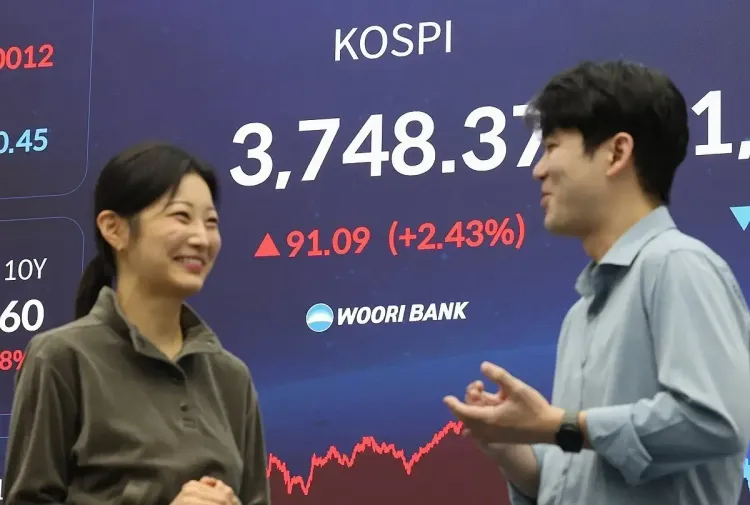How Did Seoul Stocks Achieve a Record High?

Synopsis
Key Takeaways
- KOSPI closed at a record high, rising to 3,823.84.
- Winning streak extended to five days, supported by strong performance in autos and shipbuilders.
- Heavy trading volume of 522.5 million shares.
- Institutional investors were net buyers, while individual and foreign investors sold shares.
- Mixed performance in major sectors, with semiconductors taking a pause.
Seoul, Oct 21 (NationPress) South Korean stocks have managed to extend their winning streak to a fifth consecutive day, closing at an all-time high on Tuesday, propelled by gains in the automotive and shipbuilding sectors. Meanwhile, the Korean won experienced a decline against the US dollar.
The benchmark Korea Composite Stock Price Index (KOSPI) rose by 9.15 points, or 0.24 percent, reaching a closing value of 3,823.84, as reported by Yonhap news agency.
Trading volume was robust, with 522.5 million shares exchanged, amounting to 19.3 trillion won (approximately $13.5 billion). Notably, the number of declining stocks outnumbered advancing ones, with 497 losers compared to 367 winners.
Institutional investors emerged as net buyers, acquiring shares worth 211.6 billion won. In contrast, individual and foreign investors sold off shares valued at 155.6 billion won and 12.4 billion won, respectively.
The index has been on a bullish trajectory since Wednesday, driven by optimism surrounding the easing of trade tensions between the United States and China.
Initially, the index opened significantly higher, climbing over 1 percent, fueled by strong performances from major technology stocks and robust gains in U.S. tech shares.
However, the KOSPI experienced a pullback from its early gains amid volatile trading conditions as investors sought to secure recent profits.
As the day progressed, analysts noted, "The afternoon session saw investors eager to realize their profits," commented Lee Kyung-min, an analyst at Daeshin Securities.
Most major stocks displayed a mixed performance.
Semiconductor shares took a pause after recent gains.
Industry giant Samsung Electronics slipped by 0.61 percent to 97,500 won, ending its four-day winning streak, while rival SK hynix fell by 1.34 percent to 479,000 won, also concluding a four-day rally.
On the other hand, automotive stocks experienced an uptick. Leading car manufacturer Hyundai Motor surged 3.43 percent to 256,500 won, while its smaller counterpart Kia rose 1.14 percent to 115,800 won.
In the defense sector, Hanwha Aerospace climbed 2.2 percent to close at 974,000 won, and LG Energy Solution, a leading battery manufacturer, increased 1.04 percent to 437,000 won.
By 3:30 p.m., the Korean won was trading at 1,427.75 won against the U.S. dollar, marking a decrease of 8.55 won from the previous close.
Bond prices, which move inversely to yields, fell as well. The yield on three-year Treasurys rose by 3.1 basis points to 2.600 percent, while the return on the benchmark five-year government bonds increased by 2.4 basis points to 2.711 percent.









